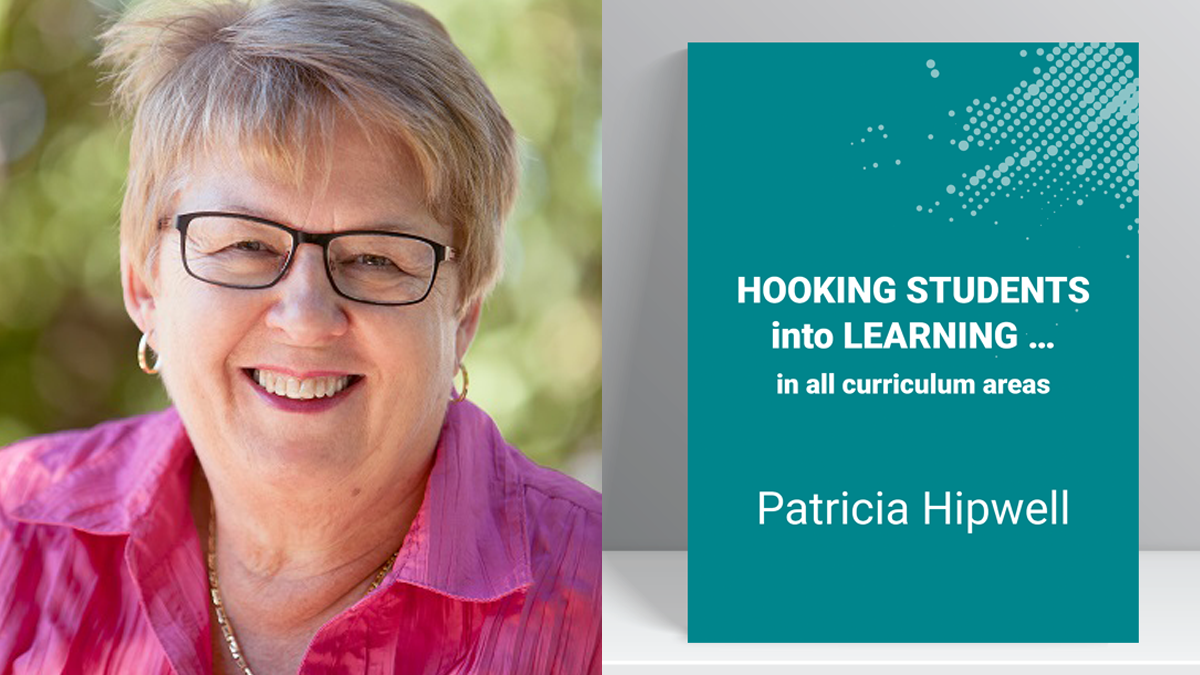
Hooking Students into Learning … in all curriculum areas, Patricia Hipwell’s latest book, will be released in October. In this Q&A, Pat tells us why she wrote the new book.
What is your new book about and how long have you been working on it?
My new book entitled, Hooking Students into Learning … in all curriculum areas is a collection of strategies for use by teachers. The strategies are for starting lessons, ensuring that students are engaged in meaningful learning activities from the opening minutes of the lesson. They also send a clear message to students that they should be doing the work, not the teacher!
This book has been a long time in the making. I have always been interested in the ‘how to’ or pedagogies associated with effective teaching and learning and began collecting strategies decades ago. When teachers were asked to be literacy and content area teachers, I honed these strategies to ones which enabled students to become more literate in the various disciplines they study. You will see that the section on vocabulary is a very large one. This is because vocabulary is not extra to the subject, it is the subject and the demands of any subject are much reduced when the teacher and students share a common understanding of the meaning of the subject-specific terms.
This book is long-awaited by many teachers. At nearly 500 pages long, typesetting, editing and proofreading have taken a long time. Finally, it is finished and should be available for sale in mid to late October 2018.
What inspired you to write this new book?
I seem to have the knack of linking the theory and practice of teaching and learning. If the research is telling us this, then this will mean particular strategies have the greatest effect. Teachers love strategies – they want to know how to best teach knowledge and skills. They get excited when students engage with their learning as a result of the strategy they are using. Most importantly though, they need to know which strategies work best for which purpose rather than see this resource, or any other, as a ‘grab bag’ of party tricks.
How do you hope this book will help teachers?
- It will give teachers hundreds of ideas for engaging students
- It will show teachers how to embed literacy teaching in content areas.
- It will challenge teachers to examine existing practices and decide which are the most effective.
- It clearly links the activity to the purpose.
- It will prevent teachers getting stuck with a few over-used strategies and invigorate their teaching.
- It can be a focus for professional learning and cross-curricula strategy use.
- It provides a rationale for each activity so that teachers can be confident that the purpose of the activity is valid.
- It gives innovative ways in which knowledge can be moved to long-term memory. I read somewhere that ‘learning is memory’.
- It will give teachers ways to teach the skills that they are testing in assessments.
- It provides examples of strategies in many curriculum areas.
How should teachers use this book?
The examples in this book are just that, examples. I know teachers like blackline masters and photocopiable resources. This book does not take away the need for preparation.
Teachers should first decide on the skill they want to teach, e.g. summarising. They go to the relevant section of the book and look at some of the activities that help develop this skill. They read through the rationale and what the teacher and the students do. Next, they get an idea of what this activity looks like with the content included in the book. Now comes the tricky part! They need to select texts from their subject area and apply the strategy to this resource. Occasionally the example included will be relevant to their subject, but I don’t expect this to happen very often.
Schools could organise professional development time for teachers to develop subject-specific examples of the skill in action.
Why should teachers use hooks?
Lesson starters or hooks are beneficial as they:
- move key facts and figures from short-term to long-term memory
- activate prior knowledge about a topic (where prior knowledge exists)
- awaken interest in the subject of the lesson
- check for understanding
- improve a variety of skills
- develop learning strategies
- improve vocabulary
- develop collaborative learning strategies
In addition, lesson hooks set a tone for the lesson from the outset- - this is a place where students work. Some teachers who use them have them already set up Students enter the classroom, get their learning materials out and start the activity. This gives the teacher time to do the roll, deal with latecomers without disrupting the learning of others and get him/herself ready for the lesson. So ‘hooks’ have a number of logistical benefits as well as significant learning advantages.





